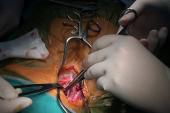Don’t Screen Broadly for Asymptomatic Carotid Stenosis, USPSTF Reaffirms
The task force says no compelling evidence has emerged to change that recommendation, last made in 2014.

The US Preventive Services Task Force (USPSTF) continues to recommend against screening the general adult population for asymptomatic carotid stenosis, maintaining its stance from 2014.
“The USPSTF found no new substantial evidence that could change its recommendation and therefore concludes with moderate certainty that the harms of screening for asymptomatic carotid artery stenosis outweigh the benefits,” according to its statement published in the February 2, 2021, issue of JAMA.
Task force member Michael Barry, MD (Harvard Medical School, Boston, MA), explained the rationale. Few strokes are attributable to carotid stenosis, and among patients with carotid disease, the annual rate of stroke is only about 1%. Screening tests, usually duplex ultrasound, are fairly accurate, but false-positive results can lead to unnecessary downstream testing and treatment. Moreover, revascularization with carotid endarterectomy or stenting does not appear to have a major impact on long-term stroke risk, with clear up-front hazards.
“Preventing stroke is worthwhile in general. It just turns out that screening for carotid artery stenosis is not a good way of doing that,” Barry said. “Fortunately, there are lots of other good ways to prevent strokes: controlling blood pressure, controlling cholesterol, not smoking, and treating atrial fibrillation when you know about it.”
Agreeing in an accompanying editorial is Larry Goldstein, MD (University of Kentucky, Lexington), who took part in the 2014 primary stroke prevention guidelines from the American Stroke Association/American Heart Association (ASA/AHA): “The currently available data clearly support the reaffirmed USPSTF recommendation against population screening for asymptomatic carotid artery stenosis.”
The task force’s reaffirmation of its previous recommendation was based on an updated evidence report and systematic review by Janelle Guirguis-Blake, MD (University of Washington, Tacoma), and colleagues, also in JAMA, focused on studies that have been published since 2014.
As before, the investigators found no trials specifically assessing screening’s impact in asymptomatic patients.
There were two new trials that provided information on the benefits of revascularization with either endarterectomy or stenting—SPACE-2 and AMTEC—in asymptomatic carotid stenosis. Results of the trials, both prematurely stopped, were conflicting. SPACE-2 failed to show that either revascularization modality was superior to best medical treatment for preventing stroke. In AMTEC, which included 55 patients, endarterectomy was associated with a lower rate of nonfatal ipsilateral stroke or all-cause death through a median of 3.3 years, but that was based on only 11 total events.
“The two new trials added little to the evidence base on effectiveness of revascularization compared with best medical therapy,” the authors conclude.
Preventing stroke is worthwhile in general. It just turns out that screening for carotid artery stenosis is not a good way of doing that. Michael Barry
Ongoing trials—including ACST-2, ECST-2, ACTRIS, and CREST-2—will provide greater insights into the benefits of carotid revascularization on the background of modern medical therapy. Barry said the USPSTF is eager to find out whether the trials will show a balance of benefits and harms that would favor treatment of asymptomatic carotid stenosis, which might shift the task force’s stance on widespread screening.
“If you can’t show that treatment does more good than harm, it just doesn’t make sense to think screening would help,” he said. He noted that “with a stroke rate in the setting of carotid stenosis of 1% per year, you’d have to follow a large number of people for many years to find that kind of benefit.”
In his editorial, Goldstein points out that medical therapy has improved over the years, causing a fall in overall stroke rates that “could obviate the small absolute benefits of interventional approaches for patients with an asymptomatic extracranial carotid artery stenosis.”
There is a question, however, about how a newer revascularization technique, called transcarotid artery revascularization (TCAR), might play into this discussion, Goldstein indicates. “Additional studies will be required to determine the role of this evolving technology and may present an additional consideration for future guidelines regarding the utility of population screening for carotid disease.”
Guidance from other professional groups around screening for asymptomatic carotid artery disease varies. Like the USPSTF, the ASA/AHA recommend against routine screening for carotid stenosis using duplex ultrasound in asymptomatic patients. Earlier guidelines from the Society for Vascular Surgery and multiple US medical societies indicate that screening may be considered in asymptomatic patients with a carotid bruit, those with multiple risk factors for stroke, and those with known PAD or CVD.
Todd Neale is the Associate News Editor for TCTMD and a Senior Medical Journalist. He got his start in journalism at …
Read Full BioSources
US Preventive Services Task Force. Screening for asymptomatic carotid artery stenosis: US Preventive Services Task Force recommendation statement. JAMA. 2021;325:476-481.
Guirguis-Blake JM, Webber EM, Coppola EL. Screening for asymptomatic carotid artery stenosis in the general population: updated evidence report and systematic review for the US Preventive Services Task Force. JAMA. 2021;325:487-489.
Goldstein LB. Screening for asymptomatic carotid artery stenosis: lack of clinical benefit, potential for harm. JAMA. 2021;325:443-444.
Disclosures
- The US Congress mandates that the Agency for Healthcare Research and Quality support the operations of the USPSTF, which is an independent, voluntary body.
- Barry reports receiving grants and personal fees from Healthwise.
- Goldstein reports receiving royalties from UpToDate.
- Guirguis-Blake reports no relevant conflicts of interest.



Comments